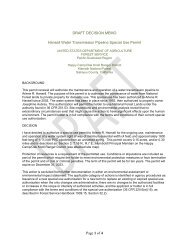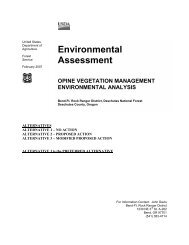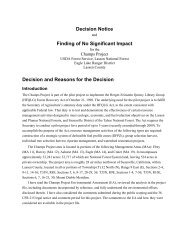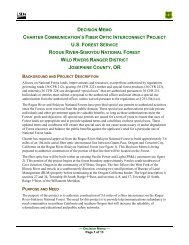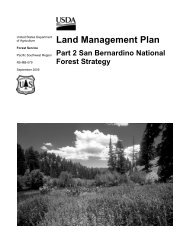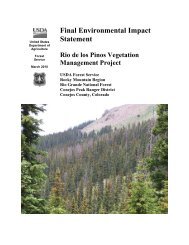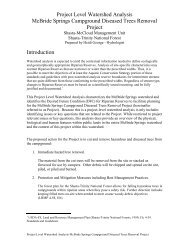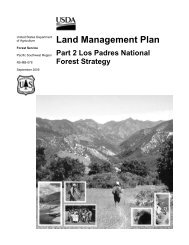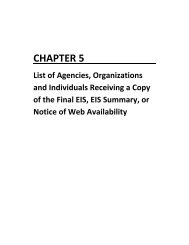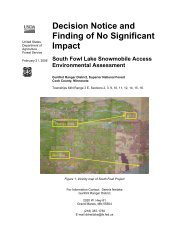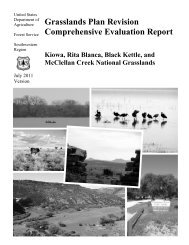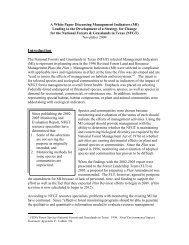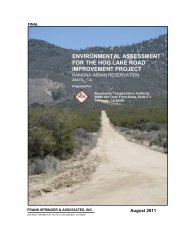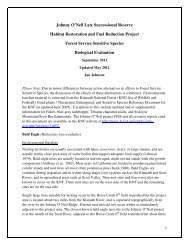Wildlife Specialist report
Wildlife Specialist report
Wildlife Specialist report
You also want an ePaper? Increase the reach of your titles
YUMPU automatically turns print PDFs into web optimized ePapers that Google loves.
Percent Change -0.17% -20.66% -45.45% -10.44% -9.77%<br />
HUC 1504000404 Whitewater - San Francisco 356.7 Total Sq. Miles (88.1% USFS -- 25.9% of USFS in Wilderness)<br />
Total FS Routes and Trails on FS Portion of HUC 0.63 0.02 -0.08 -0.13 -0.06 -0.06<br />
Percent Change 2.48% -12.25% -21.10% -8.78% -8.99%<br />
HUC 1504000405 Middle San Francisco River 242.1 Total Sq. Miles (97.1% USFS -- 1.7% of USFS in Wilderness)<br />
Total FS Routes and Trails on FS Portion of HUC 0.83 0.02 -0.17 -0.30 -0.11 -0.10<br />
Percent Change 2.72% -20.51% -36.68% -13.54% -12.31%<br />
HUC 1504000406 Negrito Creek 336.7 Total Sq. Miles (97.8% USFS -- 0.0% of USFS in Wilderness)<br />
Total FS Routes and Trails on FS Portion of HUC 1.31 0.05 -0.29 -0.67 -0.11 -0.10<br />
Percent Change 4.00% -22.41% -51.36% -8.47% -7.96%<br />
HUC 1504000408 Lower San Francisco River 376.6 Total Sq. Miles (48.8% USFS -- 14.2% of USFS in Wilderness)<br />
Total FS Routes and Trails on FS Portion of HUC 1.06 -0.06 -0.31 -0.43 -0.26 -0.30<br />
Percent Change -5.60% -29.54% -40.04% -24.19% -27.80%<br />
No Action Alternative (Alt. B): Under the existing condition the average road density<br />
across the Gila National Forest is approximately 1 mile per square mile. Claar et al.<br />
(1999) states, that wolves are habitat generalist and are a very resilient species that can<br />
coexist with people if they are tolerated by humans. They are an intelligent species,<br />
which allows individuals to adapt to different levels of disturbance. Individuals may be<br />
very sensitive to human disturbance, but others tolerate disturbance. The Mexican Wolf<br />
Reintroduction EIS did not identify road densities on the Gila National Forest as a<br />
problem. The potential for collision loss does exist on Forest Service motorized routes;<br />
however, lower traffic rates and travel speeds on forest routes reduce this potential.<br />
Increases in road densities increases the potential for take associated with poaching.<br />
Poaching on the Gila has been a problem for this species. Increases in the level of use on<br />
these routes through time would increase the potential for direct and indirect effects.<br />
Under this alternative you continue to have motorized cross country travel and dispersed<br />
camping allowed across the Gila National Forest. These two types of uses continue to<br />
have the potential to have negative impacts to the Mexican Gray Wolf. Additionally,<br />
these two types of uses perpetuate the development of additional roads and motorized<br />
trails; potentially allowing for the development of road densities that are greater than the<br />
current average of 0.99 miles per square mile. So under this alternative through time the<br />
potential for the direct loss of individuals and habitat would increase, as would the<br />
potential for disturbance effects to the species and habitat.<br />
Effect Common to all Action Alternatives (C, D, E, F, and G): Under all action<br />
alternatives motorized cross country travel (see assumption) is no longer allowed. The<br />
change from the existing condition is a 100% reduction in motorized cross country travel.<br />
Since no cross country travel is allowed in the analysis area there would be no effect to<br />
the MGW or its habitat from this activity.<br />
Differences among the Action Alternatives (C, D, E, F, and G): Miles of motorized<br />
routes and trails and acres of potentially affected habitat within the analysis area are<br />
reduced by approximately 40% under Alternative E; 29% under Alternative D; 23%<br />
under Alternative F and G; and 2% under Alternatives C (see Table 36 for specific<br />
37



